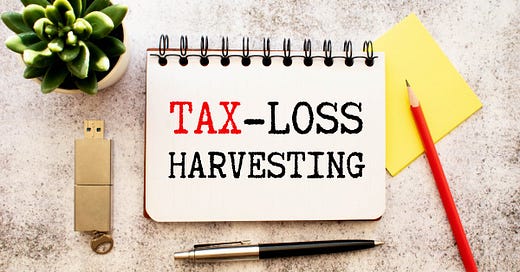Using tax loss harvesting to keep more of your money
Welcome to the +178 subscribers who joined this past week and are now part of 9,668 millionaires, CEO’s and high-performing entrepreneurs who read the #1 financial newsletter on Substack.
Please note this is a paid post. Paid subscribers get access to information free subscribers don’t get to see. I share deep dives into my favorite stocks, let you know what I’m buying and what’s on my watchlists, portfolio management tips and much more.
If you want the full experience, consider going paid below.
Market Update 🗒️💡
We had two very important Q4 2022 releases with Apple and Alphabet (Google) missing earnings. Apple took a huge hit with a 5.48% revenue decline, the biggest since 2016. Tim Cook, the CEO of Apple, has not considered layoffs yet. Stating that "layoffs are a last option” and mentioning that they will be looking to invest in acquisitions and "in innovation, in people."
Does Apple have something up its sleeve? Maybe. Tim confirms the suspicions, stating a huge focus on Artificial Intelligence going into 2023. This could mean big things for Apple and humankind, as with the release of Microsoft-backed OpenAI's ChatGPT, stocks with the letters 'A' & 'I' have gone unequivocally parabolic.
C3.ai Inc. (AI)- Up 139% in the last month
BigBear.ai Holdings, Inc. (BBAI)- up 582% in the last month
If these 2 stocks continue in an upward trend, we could be looking at a major reversal that you can capitalize on.
Tech giants have now spent 100s of millions of dollars acquiring AI startups and have invested 100's of millions more. Any corporation that cannot harness AI will fall behind, while the others that do will be looking at contributing multiple trillions of dollars to the global economy.
Do you hate taxes? Same.
Lucky for you, I’m going to show you how to save on taxes and pay less of them, 100% legally.
It’s true some of the wealthiest people in the world pay the least amount of taxes because they have figured out how to work around the system.
Davis Mullins, a certified financial planner, said “By utilizing tax loss harvesting, you are in essence making lemonade out of lemons”.
In this post, I’m going to show you how to make lemonade. Class is in session.
What is Tax Loss Harvesting?
Tax-loss harvesting happens when you sell an investment that has dropped below the price you bought it, also known as a capital loss. It’s a strategy that is often used to limit the amount of taxes an investor would pay on short-term capital gains, which are typically taxed at a higher rate than long-term capital gains.







